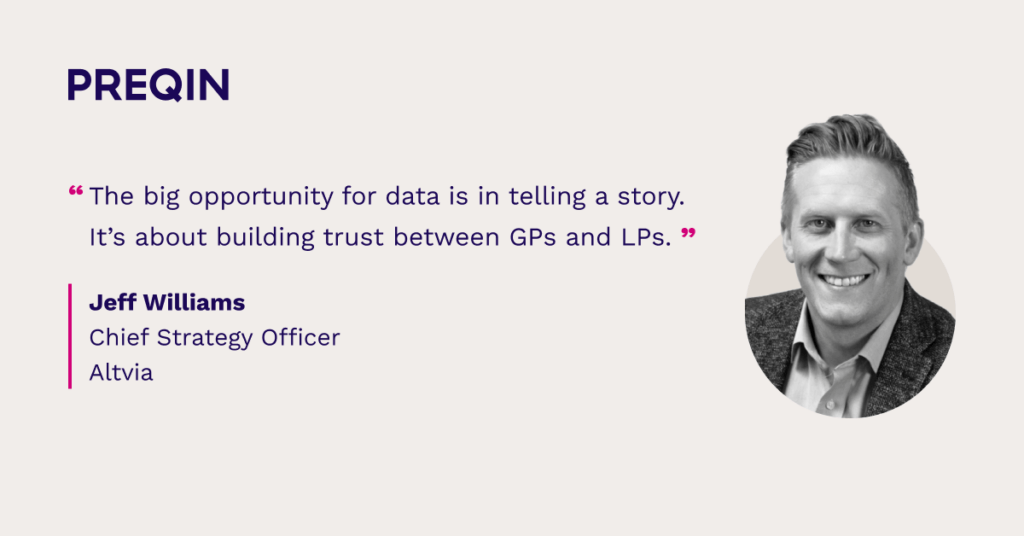
How can data be used more effectively?
First off, data should be used to help drive decision-making. No question about it. The reality, though, is that good investors have instincts and don’t make decisions purely based on data. When you combine that with how much is available after making an investment decision, the big opportunity for data is in telling a story. At the end of the day, it’s about building trust between GPs and LPs. There are regulatory requirements for what should be reported and how it should be laid out, but that’s only a small part of it. It’s about sitting down together and saying: here’s the story. When you have data and flexible ways of understanding it, that helps you demonstrate and tell the story of why you’re truly different. And that’s what LPs are dying for – to be shown something different.
Where do LPs most want to see improvements in communication from GPs?
Recently, we’ve had a lot of open and honest conversations about response speed – something that historically nobody has wanted to talk about. I’ve been an LP and when you make a request, you know the timer has been set. Once set, GPs are concerned that they’re now being judged, and for good reason, because LPs have confirmed time and time again that they are! The issue for GPs is that they can always share more information and take longer. But if it takes too long, there’s a point at which the information you’re sharing has diminishing returns. LPs seek trustworthy managers, and trustworthy managers should offer breadth, depth, and speed.
How do CRM needs in private equity differ from standard platforms?
For the most part, people view a CRM as a Rolodex-plus. But we’ve arrived at the belief that the customer – the LP – is the only reason anybody is doing anything. LPs are buying a service, and what the customer gets is information about the service and the investment decision.
So, managing the relationship with your customers is about understanding your investment portfolio, the deals you are looking at, performance, growth, risk, and so on. We’re focused on enabling the full picture. As such, our CRM is about bringing data across the firm together and putting it into a helpful format, so that the people managing the relationship can create a better experience for the customer.
Where in the investment lifecycle should GPs focus?
I think GPs are feeling that they need to get it together across the board – or are worried that somebody else is getting it even more together, and faster. Some are running around trying to create a façade that they’ve been diligent and systematic, but they are leaving gaps. LPs are after greater detail, and are judging GPs on how they respond. Whether it should be or not, the reality is that it has become a proxy for how well the fund is run and managed.
Data is crucial to decision-making. What are the main issues with GP data?
The focus is on proprietary data. If we all have the same data, it’s just a race to slice and dice it. So the focus is on proprietary data, on quality and accuracy, and on how you get it. Lots of data is still encapsulated inside documents, in poorly formatted text strings and lengthy email chains, so the focus is on harnessing all that data efficiently, no matter where it is. There are technology tools to help with both accuracy and quality, detecting and fixing issues with high confidence. But those tools don’t get used if the data is never captured from an inbox, document, or even from a verbal communication.
What technologies do you think will have the biggest impact over the next few years?
We’re having an AI moment and everybody feels they need to say something. That’s how we know that there’s something truly there, but also that there’s a lot of noise. What we’re really interested in is wading through the noise to find exactly where AI can solve real problems in novel ways. Right now, much of the noise is coming from AI being a solution looking to find problems to solve. But these periods of upfront mania are well understood among psychologists and analysts, and they come at the beginning of innovations that will have long-term value.
About Jeff Williams
Jeff Williams is Chief Strategy Officer at Altvia. He joined the company in 2011, bringing with him deep technical understanding and industry experience from Greenspring Associates, a fund-of-funds. He has worked across the company, leading departments from product, development, and marketing, and works with clients to make the vision of Altvia come to life through the development and launch of products that solve the issues facing GPs and LPs.
This article originally appeared in Preqin Global Report 2024: Venture Capital. The opinions and facts included in the above do not constitute investment advice. Professional advice should be sought before making any investment or other decisions. Preqin and Altvia accept no liability for any decisions taken in relation to the above.
